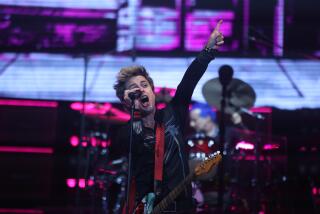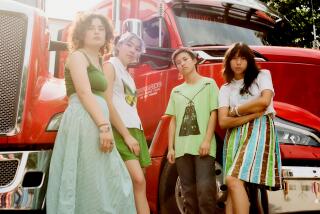Green Day’s Not-So-Punk Rock
Mindful of a Grateful Dead concert that got seriously out of hand 15 years ago, the Home Depot Center in Carson maintains a blacklist of 28 musicians -- including Eminem, Snoop Dogg and Metallica -- whom officials consider too wild for its venue.
One of the acts on the list was Green Day, the punk rock band that rocketed to fame in the mid-1990s with songs about suburban alienation mixed liberally with references to drug use and sex.
For the record:
12:00 a.m. May 1, 2005 For The Record
Los Angeles Times Sunday May 01, 2005 Home Edition Main News Part A Page 2 National Desk 1 inches; 39 words Type of Material: Correction
Green Day -- An article in some editions of Saturday’s California section said the band Green Day would perform at the Home Depot Center in Carson in September. In fact, the band will play there Oct. 8 and 9.
But earlier this year, Green Day won the Grammy for best rock album of 2004.
So earlier this month, the Home Depot Center’s board voted to remove Green Day from the list and book the band to perform in October.
Officials insist Green Day has toned down.
“Clearly, [in] the last few years, Green Day has become more mainstream and more acceptable to great numbers of fans,” said Michael Roth, a spokesman for the venue’s owner, Anschutz Entertainment Group.
But some neighbors, who helped draw up the list of banned musicians, are skeptical of the venue’s motives.
Louise Campbell, 76, who lives at Colony Cove Mobile Estates, said she worries that Green Day’s shows will attract the type of noisy, disruptive fans that the list was designed to bar.
Campbell admits that she has never heard any of Green Day’s songs but says the decision to allow them to perform is all about the group’s new popularity.
“I think they have to do something to make money,” Campbell said.
“No question about it,” said Gil Smith, whose home is 50 feet from the center, where the Los Angeles Galaxy and Chivas USA soccer teams play.
Smith, a parliamentarian of his homeowners’ association and a former Carson city councilman, said the list of bands was developed after a pair of notorious Grateful Dead concerts at the now-demolished Olympic Velodrome.
Smith recalled tens of thousands of tie-dye-clad Deadheads descending upon his peaceful tract-home neighborhood, openly smoking marijuana and dropping LSD.
“They had people all over the place,” said Smith, 71.
“Let alone the type of music and the noise, people were roaming all over the neighborhood. There were instances where patrons urinated in the yard and all that other stuff. Everything you could think of was going on. Literally.”
The 125-acre Home Depot Center, which is on the campus of Cal State Dominguez Hills, opened in 2003, replacing the velodrome.
Residents, university officials and the venue’s owners did not want a recurrence of the Grateful Dead weekend, so they developed the list of permitted and prohibited artists, banning performances that included “blatant references to satanic rituals or explicit sexual or violent acts.”
There are 28 artists on the roster, many of them hip-hop musicians such as Ice Cube, Dr. Dre, Puff Daddy (now known as P. Diddy) and Silkk the Shocker.
One of those banned, onetime child performer Lil’ Bow Wow, is now 18, has launched a clothing line, dabbles in feature films and has shed the Lil’ moniker. Eminem is listed along with his onstage alter-ego, Slim Shady.
On the rock side, the list bans the Grammy-winning and multi-platinum metal band Metallica. Other groups include the now-disbanded Rage Against the Machine, Christian rockers Creed, and 1980s stalwart Def Leppard, best known for its hit “Pour Some Sugar on Me.”
When it was added to the list, Green Day was known mostly as a teen band whose angst-filled songs dealt with juvenile delinquency and bodily functions.
But since then, the group changed its look and became more political. Band members traded in dyed green hair for eyeliner, T-shirts for pinstripe suits, and lyrics about suburban ennui for President Bush-bashing.
Green Day was approved by a 5-1 vote at an April 15 meeting that also gave approval for possible concerts by the Dave Matthews Band and Santana.
Home Depot is far from the only venue to ban certain acts.
The Grateful Dead was banned from several concert facilities in the early 1990s because of unruly behavior by fans.
Rappers and some hard-edged rock groups have also had the welcome mat pulled after violent episodes.
But the Carson venue has a banned list and an accepted list of acts.
Green Day now shares space on the list of permitted acts such as Kenny G., Ricky Martin, Faith Hill, Britney Spears, Patti Labelle and Hanson.
A spokesman for Warner Bros., Green Day’s record label, said the band was not available for comment.
Tickets have gone on sale and organizers hope to fill the stadium, which has a capacity of 27,000.
Kent Gibson, executive director of the Cal State Dominguez Hills Foundation and a member of the committee that reviews concert proposals, said he always considered the list to be one that evolved with time.
“I don’t know Green Day’s music, I’m a little too old,” Gibson, 59, said.
“But they seem more middle of the road.”
More to Read
The biggest entertainment stories
Get our big stories about Hollywood, film, television, music, arts, culture and more right in your inbox as soon as they publish.
You may occasionally receive promotional content from the Los Angeles Times.











